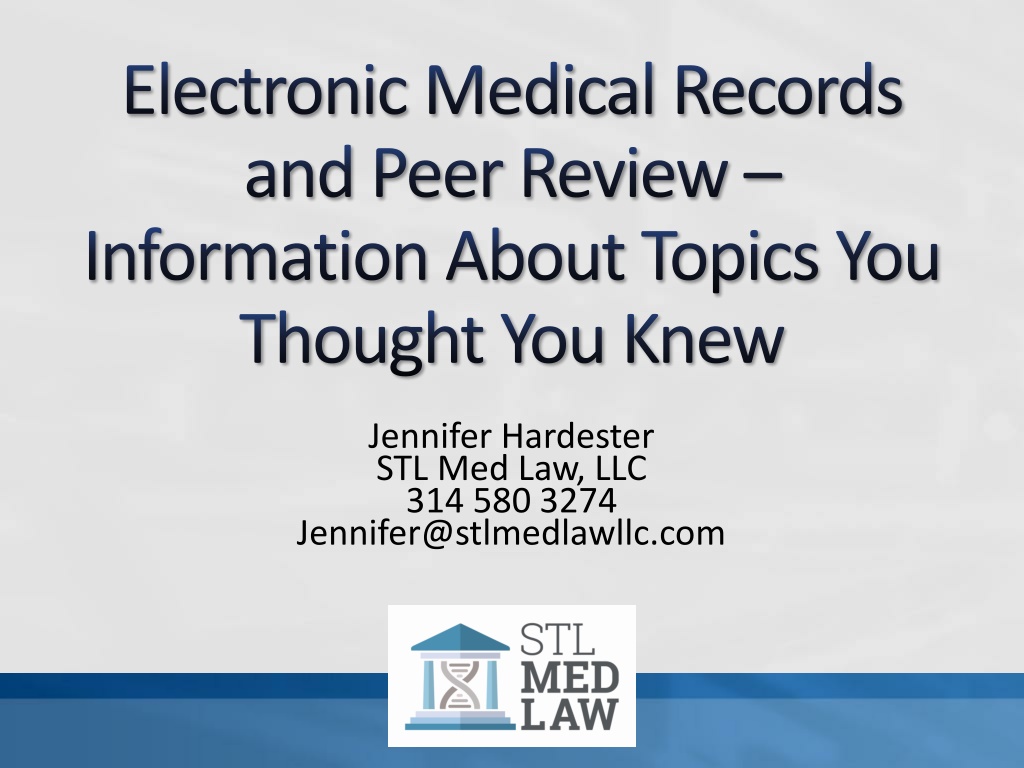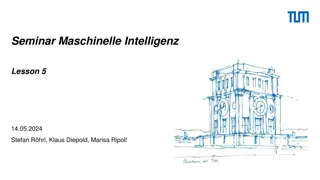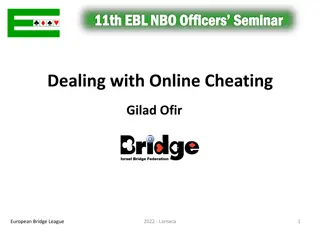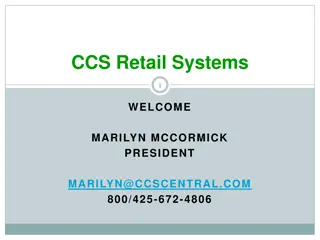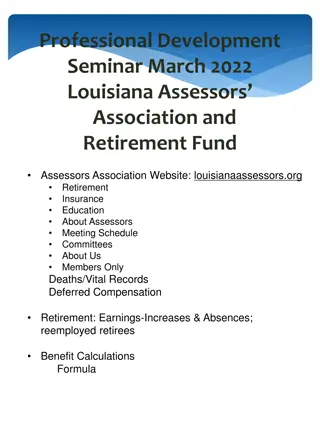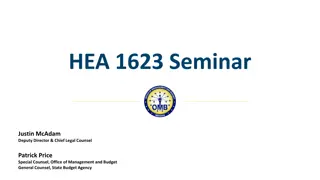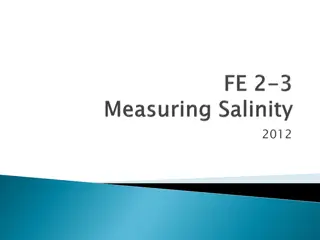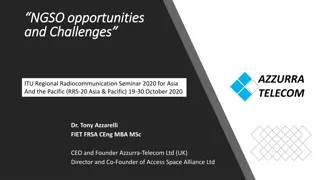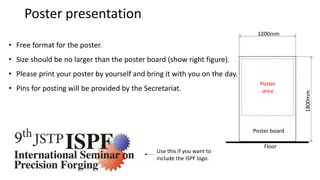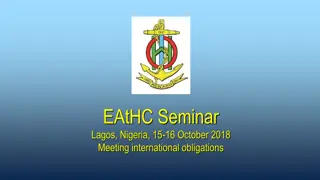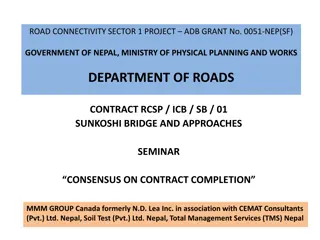Insights on Electronic Medical Records and Peer Review Practices by Jennifer Hardester STL Med Law, LLC
Explore essential information on electronic medical records, peer review practices, and legal nuances shared by Jennifer Hardester from STL Med Law, LLC. Gain insights into challenges, examples, and the importance of defining medical records within healthcare entities.
Download Presentation

Please find below an Image/Link to download the presentation.
The content on the website is provided AS IS for your information and personal use only. It may not be sold, licensed, or shared on other websites without obtaining consent from the author. Download presentation by click this link. If you encounter any issues during the download, it is possible that the publisher has removed the file from their server.
E N D
Presentation Transcript
Electronic Medical Records and Peer Review Information About Topics You Thought You Knew Jennifer Hardester STL Med Law, LLC 314 580 3274 Jennifer@stlmedlawllc.com
Examples . . . About 2.5 years into litigation and 3 weeks before trial, client found 6 pages of records not stored in the normal record Produced to opposing counsel and judge recommended sanctions Video stored in vendor s cloud related to surgical equipment showed portions of surgical procedure at issue in case no one knew it was there until litigation well underway Discovery requests didn t cover this, so never produced
Examples, continued Peer review process is nicely memorialized in Bylaws, policies and guidelines. Adverse Event occurs and clinical staff start meetings, dialogue, text messaging all before triggering process Other issues exist in adverse event which need to be addressed on a business level Leadership reaches out to discuss with third parties, all outside of the peer review process
Medical Records What is the legal medical record ? How is that different from the record of care ? What is a designated record set ? 45 CFR 164.501 Different electronically than paper, but we had these issues with paper too TJC and CMS expects hospitals and other healthcare entities to define its medical record
Medical Records, continued Of course, standard ask for everyone is the record of care Problem is .lots of records exist even records that address the care provided which don t end up in the final record Couple of tips for everyone: Go see the records in their native format Remember what an authorization gets versus a court order (45 CFR 164.524 vs 164.512(e),(f))
So, what is Missouri Peer Review? Peer Review Statute RSMo. 537.035 Communications regarding patient care made by a qualified peer review committee from disclosure in the context of litigation involving an alleged failure to provide appropriate care
So, whats up with Peer Review? Applies to hospital committees of health care professionals (licensed personnel): Interviews, memorandums, proceedings, findings, deliberations, reports and minutes concerning the health care provided any patient Persons in attendance cannot be required to disclose or testify Protections cannot be waived Committee members may invoke privilege but only with respect to materials created or generated as part of the peer review process
So, whats up with Peer Review? Issues: Discoverable if otherwise available Can be required to testify as to personal knowledge Protections do not apply in peer review litigation or in licensure actions Not clear state protection in federal court with federal cause of action? Not clear as to whether information can be freely shared throughout a healthcare system
Peer Review Process, cont. What s required? Joint Commission Standard LD.04.04.05: As part of the safety program, the leaders create procedures for responding to system or process failures. The leaders provide and encourage the use of systems for blame-free internal reporting of a system or process failure, or the results of a proactive risk assessment. Missouri State Hospital Regs: 19 CSR 30-20.112 and 19 CSR 30-20.082(12)
Peer Review Process, cont. Normal Process for event reviews Event occurs Debrief Decision on how to proceed (stop analysis, sentinel event, other) Morbidity and Mortality meeting External peer review? What is the organization s policy/procedure and did they follow it?
Federal Patient Safety Privilege Patient Safety Organization (PSO) Federal Patient Safety Privilege (42 U.S.C. 299b-22) WHAT?? Generated by or requested by an approved Patient Safety Organization ( PSO ) Patient Safety Work Product data, reports, records, memoranda, analyses (like a Root Cause Analysis), or statements reported to a PSO for the conduct of patient safety activities So .any data outside of the PSWP would not qualify for this privilege Also does not apply to information collected for purposes in addition to the PSO Most information is collected for purposes other than/in addition to the PSO, so it s likely privilege doesn t apply
Attorney-Client Privilege Unlike work product, protected even if other side has no way to obtain the information If client corporation, privilege always attaches to protect communication with top management Lower level too but only if: Securing legal advice at direction of superior Subject Matter within employee s scope Only for those who need to know Practical Application
Other Issues to Consider Starting at the Beginning Are you sure you have all the records? What are the records? Audit trails? EMR Systems? Equipment Data Policies/procedures/Bylaws about record retention, event investigation Regulatory audits/reports? Fact finding and internal investigations? External peer review? Cast a broad net in terms of asking questions about who s been involved
Lessons Learned? Ask questions and figure out the record Look at record in native/original format Ask a lot of questions of a variety of people Think department-wide versus hospital-wide in terms of asking about records Event investigation vs. debrief vs. RCA/sentinel event analysis vs. peer review
